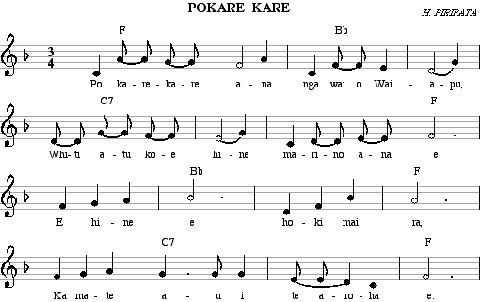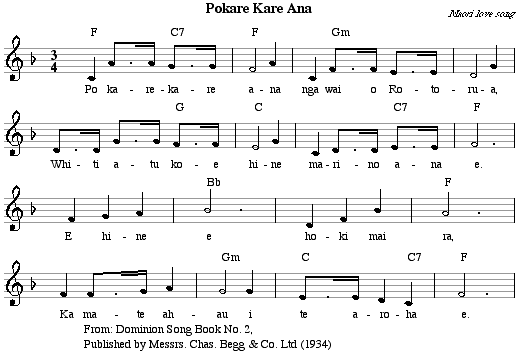| NEW ZEALAND FOLK *SONG |
Pokarekare Ana for mobile phones |
Words and tune
Origins
- Emanating in the North
- Modified by Tomoana
- The Apirana Ngāta connection
- Different song-writing styles
- Conclusion; a group composition
Variations
1. Old Dalmatian folk song?
In 2006 Paul Ward, a writer for a TVNZ documentary on the Dalmatians settlers in Northland's Puhoi area wrote, "I've heard anecdotally from a number of people that we've interviewed that the tune for Pokarekare Ana came from a Dalmatian folk song."
There has been no confirmation of this yet. the Puhoi fiddlers could have picked up the Tomoana tune in the 1920s, so we would really need to find some pre-1910 manuscripts from Yugoslavia to verify this. Possibly only the verse tune was Dalmatian and Tomoana added the chorus tune.
2. Sung in theatres in 1919
From the Poverty Bay Herald 37 June, 1919, Miss Bathie Howie-Stuart responded with the popular "Pokarekare," in which the soft melodious Maori words and the typical Maori refrain are a feature. Thls was the most popular number on the programme.
Other provincial newspapers mention her singing it around the country.
3. Piano sheet music in 1926
- 1926 - POKARE KARE H Piripata , arranged by H Rosch (A. Eady and Co Auckland NZ), with Maori and English words.
This was arranged in 3/4 time.
It had Ka ma te a-u i
instead of Ka ma-te a-ha-u i SEE BELOW
- 1926 - Pokarekare (agitated): a Maori love song , collected and arranged by Alfred Hill (Dunedin, McIndoe,) There are two separate versions; a piano score with English words, and a melody line "Maori version."
It was 1965, 21 years after Tomoana's death, before anyone (mistakenly) attributed its composition to Tomoana.
- 1965 - Pokarekare : a Maori love song / composed by P.H. Tomoana ; English lyric and arrangement by Sam Freedman. Music score. Seven Seas Publishing.
4. Original waltz tune
The song was originally arranged in 3/4 time, to be played on the piano and danced to as a waltz.
John McDougall has suggested that the timing was changed to 4/4 time with the introduction of the guitar as an accompaniment. The guitar became popular after World War II, but in 1969, the NZBC Broadcasts to Schools song book still taught Pokare Kare Ana in the rather subtle 1934 waltz arrangement, and with 5-part harmony.
Someone may like to check these old recordings to find out when the 4/4 version began. It is generally sung in a more plodding 4/4 timing now.
1926 score.
Turn your iPhone sideways
Hear it played as a midi tune.
5. Hemi PiripataHemi Piripata was the pseudonym of James Henry Phillpot, an Auckland church organist, composer and musical arranger. Born in Wales in 1861, he migrated to Auckland in 1884 and died in 1937. Apparently he went for a holiday from Auckland to Rotorua in 1925, liked the Maori concert party songs he heard there and started writing them down and doing arrangements. Eady's would have then sold his music scores in Rotorua the same way that souvenir CDs are sold there today.H. Piripata is given as the composer on the page of POKARE KARE sheet music published in 1926 in the music album Famous Maori Songs by Charles Begg & Co Ltd. This is an error; he only arranged the piano score. On several other pages with no composer named, but with composition now attributed to others, Hemi Piripata is given as the arranger: E Rere Taku Poi, Hoea Ra, Haere Ra . He is also named as arranger of twelve songs in a similar songbook "Waiata O Te Iwi Maori". Charles Begg & Co, ( with English verses by Morihi Keiha) The 12 songs are Haere Mai, Te Wairua Ote Tau, Me Hoe Tatou, Ka Titiro Atu Au, E Noho Nei I Te Atarau, Ruriruri, Kei Reira Ko Te Ipo, Naku Te Whare, Waiata Whai A Ipo, Karo, Haere Ra, A Te Wai Pouri. Since the 1930s, there have been over a hundred recordings of Pokarekare Ana published. The National Library of New Zealand online catalogue has details of them. 6. At funeralsPokarekare Ana can be sung at funerals. Usually just the first verse and chorus, or if you are confident the E kore te aroha verse as well. If the deceased is a man, the word hine could be replaced with tama. E tama e, hoki mai ra. 7. In Rotorua Pakeha often sing This is the version sung to tourists at Rotorua, with the first and last verses to express the emotion of the story of Hinemoa. This beautiful girl swam to Mokoia Island in the middle of Lake Rororua meet Tutanekai, her lover, guided by his playing of the flute. 8. In KoreaDuring the Korean War, NZ Army taught Pokarekare Ana to the Korean children. This is now sung with Korean words.
9. From East Timorsent by João Esperança in 2012."The song "Ha'u hakerek surat ida" has been around East Timor for decades. I think it became popular in Portuguese colonial times, maybe in the 60s.... The East Timorese author of the lyrics, Momô dos Mártires, died recently."
10. The Earnslaw Steam ThemePokarekare Ana is heard as a portion of the Earnslaw Steam Theme by Ron Goodwin and the NZ Symphony Orchestra. The Earnslaw is an old steamship that does tourist trips on Lake Wakatipu. Listen to this MP3 Earnslaw sound sample. Spelling and pronunciation
Other versions |

